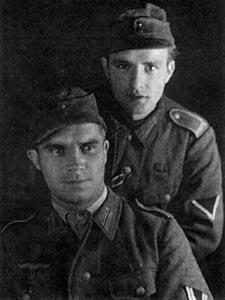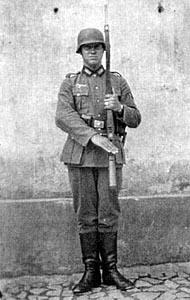Eugen Rothenhofer
While Eugene had an uneventful start to his war, the inevitable took place;
he was sent to the eastern front. He was wounded during the battles on
that first horrible winter, and received both the Wound Badge and the Eastern
Winter Campaign Medal. After battling through two more brutal winters, he
was sent to the west only to participate in battles following the landings in
Normandy and the long retreat into the Fatherland.
Eugen was born on March 10, 1914 in Heilbronn Germany, amd married on October 27, 1939. His draft/enlistment date is unknown it at this time and the earliest known date of any Military activity is December 22, 1939 when he was with 1./ Inf.Rgt. Ers. Btl. 34. Eugen stayed with Ers. Btl. 34 until July 12, 1940. From June 12 1941 to January 6, 1942 Eugen was with 1./ Inf.Rgt. 725 of the 715th Infantry Division, which was formed in April 1941, with personnel from Wehrkreis V. at this time the 725th Div. was sent to southwestern France. The Deutsche Dienststelle shows them being along the Atlantic coast. On July 9, 1941 Eugen became a member of 4./ Inf.Rgt.306 0f the 211th Infantry Division which was also in southwestern France on occupation duty.
In January 1942, the 211th Infantry Division was sent to Russia, Army group central. The division arrived in the combat zone on January 17th 1942, and was immediately rushed to the area around Zhisdra and Belev. Here the Russians had separated the 4th Army from the 2nd Panzer Army and created a large gap and were hoping to expand it and sweep behind Army group center. The area where the 211th Inf. Div. was committed was on the southern side (2nd Panzer Army) of the breakthrough. In extremely heavy defensive fighting, continuing to the end of February, this division along with others prevented the expansion of the breakthrough sector and helped thwart the Russian operation.
Sometime around July 9, 1942, Eugen was wounded. He received the Black wound
badge and according to the field post number, 29182 E, he was with the 306th
Infantry Regiment/ 211th Infantry Division. He would later receive the Eastern
Campaign Medal. After recuperating from his injuries, he returned to his
division which remained in defensive positions at Zhisdra operating as part of
the 24th Korps, and 47th Panzer Korps, 2nd Panzer Army until the summer of 1943.
(Information received from the Dienststelle has the 211th I.D. in January of
1942 in Bretagne (in the west) and starting in February in the “mitte osten” (middle east), at Brjansk with the 2nd Panzer Army until July of
1943). Eugen Rothenhofer (foreground, notice the Eastern
Campaing Medal Ribbon) Eugen Rothenhofer In August of 43, the 211th was attached first to the 2nd Panzer Army then
with the 9th Army in Dorogobusch, where they remained until November of that
same year. In December, now attached to the 3rd Panzer army at Newel and onto
Witebsk until February of 1944. In the next few months the Division would move
often; March saw the 211th in Bobruisk, April through June with the 2nd Army in
Kowel , July with the 4th Panzer Army at Kowel and in August back with the 2nd
Army in Bug.
On September 22, 1944, Eugen was transferred to the 1./Gren.Rgt. 1052 of the
84th Infantry Division.


standing guard
The 84th was then sent to the Somme River area in the rear to reform and be reinforced. In September, attached to the II Parachute Corps, 1st Parachute Army, the 84th fought against the U.S. 82nd Airborne Division in the Nijmegen area during operation Market-Garden. This was the Allies first attempt to break through the Rhine defenses. The 84th suffered heavy casualties in the fighting and remained on the front lines in the Western Front. In January of 1945, the 84th was fighting in the Kleve area of the Netherlands and in late March was finally smashed by heavy British air and ground attacks. Many of the division’s officers were captured along with most of the LXXXVI corps. It is believed Eugen was captured here on March 24, 1945 by the British, who held him in captivity until March 2, 1946.
In addition to the story, here is information received from the Deutsche
Dienststelle about the 84th; In September of 1944 the 84th was attached to the
1st Fs. Army in Venlo in the west. Sometime around November of 1944 it moved to
Kleve, where it remained until Feb./March and then they show the 84th in the
Wesel area. An alternative theory is that the 82nd Airborne Division landed
nearly on top of the 84th/1st Fs. Army near Nijmegan close to Germany. After
intense fighting, they fell back to Germany and fought the Canadian and British
Army. As resistance started to crumble they retreated through Wesel, Munster and
Hamburg.
According to his family Eugene spoke little of the war, and carried the emotional and physical scars throughout his life. Of the horrible conditions during that first winter on the Eastern front, his family only remembers his tales of having to eat rats in order to stay alive.
Upon his return to Germany, Eugene returned home to his wife and worked for NSU (A major German car maker). He would eventually have have 5 children. The physical scars of the war would manifest themselves later in his life. In the late 1970’s, he lost one of his legs due to poor circulation as a result of his war injury and in the mid 1980’s he lost the other one for the same reason. Eugene passed away in 1994, in his German homeland, at the age of eighty.
![]()
© Copyright Wehrmacht-Awards.com LLC |
